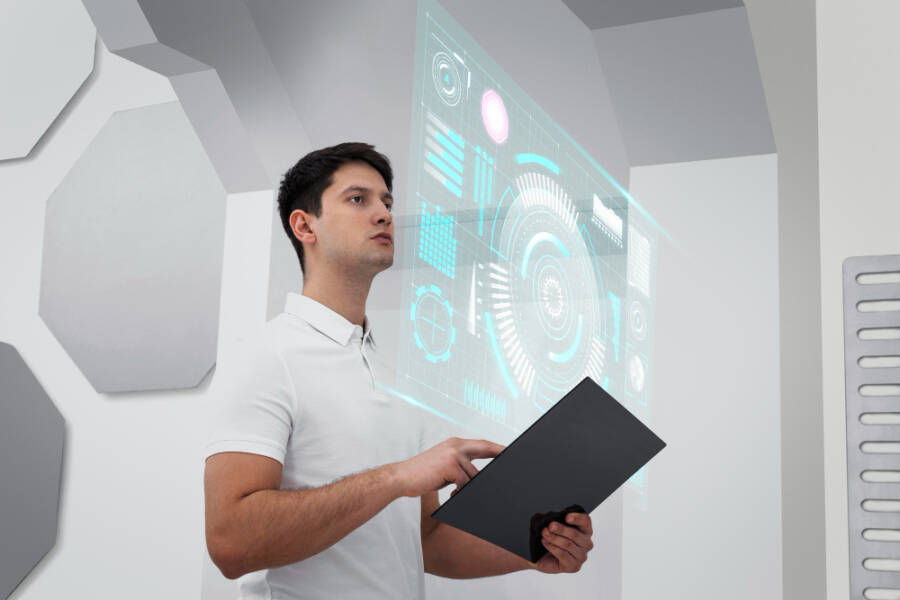In the rapidly evolving landscape of technology, the convergence of Artificial Intelligence (AI) and the Internet of Things (IoT) is revolutionizing the development of connected devices, offering unprecedented capabilities and efficiencies.

In recent years, the integration of Artificial Intelligence (AI) with the Internet of Things (IoT) has become a game-changer for the tech industry. This fusion is transforming how connected devices operate, communicate, and make decisions. AI enables these devices to process vast amounts of data and derive actionable insights, thereby enhancing their functionality and efficiency.
As IoT continues to expand, the role of AI in this domain becomes even more critical. IoT software development companies are leveraging AI to create smarter, more autonomous devices that can significantly improve user experience and operational efficiency.
Transforming Data into Insights: The Power of AI in IoT
One of the most significant advantages of integrating AI with IoT is the ability to transform raw data into valuable insights. Connected devices generate enormous amounts of data, which can be overwhelming to analyze using traditional methods. AI algorithms, particularly machine learning, can sift through this data to identify patterns, trends, and anomalies.
By applying AI to IoT data, companies can gain deeper insights into device performance, user behavior, and environmental conditions. This information can be used to optimize operations, enhance product offerings, and even predict future trends, giving businesses a competitive edge.
Enhancing Device Interoperability and Communication
Another crucial role of AI in IoT is improving device interoperability and communication. In a typical IoT ecosystem, various devices need to communicate with each other seamlessly. AI can facilitate this by standardizing communication protocols and enabling devices to understand and react to each other’s signals.
Moreover, AI-driven systems can adapt to new devices and technologies as they are introduced, ensuring that the IoT network remains robust and scalable. This level of interoperability is essential for creating cohesive and efficient IoT solutions.
Predictive Maintenance: Reducing Downtime and Costs
Predictive maintenance is one of the most practical applications of AI in IoT. By continuously monitoring the condition and performance of equipment, AI algorithms can predict when a machine is likely to fail or require maintenance. This allows companies to perform maintenance proactively, reducing downtime and avoiding costly repairs.
For instance, in industrial settings, AI-enabled IoT devices can monitor machinery for signs of wear and tear, alerting maintenance teams before a critical failure occurs. This not only extends the lifespan of the equipment but also improves overall operational efficiency.
Ensuring Security and Privacy in AI-Driven IoT Systems
Security and privacy are paramount concerns in any IoT deployment, and the integration of AI adds an additional layer of complexity. AI can be both a boon and a bane for IoT security. On one hand, AI can help detect and respond to security threats in real-time, identifying unusual patterns that may indicate a cyber attack.
On the other hand, the use of AI requires careful handling of sensitive data to ensure privacy. Companies must implement robust security protocols and data encryption methods to protect user information. Additionally, ethical considerations must be addressed to prevent misuse of AI-driven insights.
Future Trends: The Next Frontier of AI and IoT Integration
The future of AI and IoT integration holds exciting possibilities. Emerging technologies such as edge computing, 5G, and blockchain are set to further enhance the capabilities of AI-driven IoT systems. Edge computing, for example, allows data processing to occur closer to the source, reducing latency and improving real-time decision-making.
Furthermore, the advent of 5G will enable faster and more reliable communication between IoT devices, while blockchain can provide enhanced security and transparency. As these technologies mature, we can expect to see even more innovative applications of AI in IoT, driving further advancements in various industries.
In conclusion, the integration of AI in IoT software development is revolutionizing the way connected devices operate and interact. From transforming data into actionable insights to enhancing device interoperability and ensuring security, AI plays a pivotal role in advancing IoT technology.
As we look to the future, the continued convergence of AI and IoT promises to unlock new possibilities and drive unprecedented efficiencies across industries. Companies that embrace this integration will be well-positioned to lead in the rapidly evolving tech landscape.
TechnologyHQ is a platform about business insights, tech, 4IR, digital transformation, AI, Blockchain, Cybersecurity, and social media for businesses.
We manage social media groups with more than 200,000 members with almost 100% engagement.








































